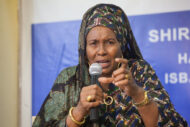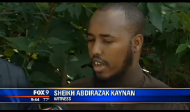

The tradition of depicting the Prophet (peace be upon him) in a bad light, however, is not new. The West has had a long and entrenched tradition of promoting false and distasteful images of the Prophet of Islam, even by the most scholarly of them.
What is not known to them is the respect in Islam about other religions and how Islam seeks to establish good relations with other traditions through a profound understanding of the knowledge and major authorities of other people.
Muslims for instance believe that Prophet Moses (peace be upon him) occupies a unique status among the prophets (peace be upon all of them), for he was the only Prophet who spoke with God Almighty. In addition, Moses is the single most-mentioned Prophet in the Qur’an (136 times).
It is related that a Muslim and a Jew quarreled. When the Jew praised Moses over Muhammad (peace be upon them both), the Muslim insulted the Jew. The Jew complained to the Prophet (peace be upon him) who replied: “Do not confer on me superiority over Moses, for people will be struck unconscious of the day Resurrection and I will be the first to regain consciousness. And behold! There I will see Moses holding one of the pillars of Allah’s Throne. I will wonder whether he has become conscious before me or he has been exempted because of the unconsciousness he experienced on Mount Sinai.” (Al-Bukhari, 2411)
The Muslims therefore respect the religious figures and leaders of other communities. They strictly followed this lesson throughout the ages. As such, history does not record any major incident in Islam where Muslims slandered or degraded in any way or from any of the previous Prophets (peace be on them all). On the contrary, they held them in high regard. Furthermore, belief in each of them is a fundamental part of Islam. Moreover, Muslims connect their respect for the prophets closely to the Christian and Jewish traditions.
The Qur’an reveals that Jesus (peace be upon him) was a sign of God’s existence and His All-Pervasive creative power, which creates whatever is in accordance with divine will. His birth was a unique miracle. Likewise, God Almighty created Adam (peace be upon him) out of clay with no father or mother. Many millennia later, He created a male infant within the mother’s womb without a father. For God, both are created miraculously: “It is not [befitting] for Allah to take a son; exalted is He! When He decrees an affair, He only says to it, “Be,” and it is.” (Qur’an, 19:35)
All the circumstances surrounding Jesus’ life — his miraculous birth, the status of his mother the Virgin Mary, his miraculous disappearance from the world, and his reappearance in the future — distinguishes him from all other prophets. The Qur’an confers on Jesus and Mary a unique status and an elevated rank among all Muslims. Indeed, chapter 19 in the Qur’an is called “Mary,” which contains the story of her son’s miraculous birth.
In this chapter, God’s name Ar-Rahman (the Most Merciful) is repeated more than in any other chapter (16 times), and Prophet Jesus is described as “an act of mercy from Us.” (Qur’an, 19:21) Prophet Muhammad (peace be upon him), of course, is identified with mercy in the Qur’an and this repetition of mercy in Mary indicates how divine mercy encompasses all the prophets and especially Jesus.
One of the spectacular examples of the Prophetic respect and honor of other religions, especially Christianity, is when the Prophet (peace be upon him) allowed Christians to pray in his own mosque according to the Christian way of praying. A Christian delegation from Najran visited Madinah. The delegation was composed of 60 individuals headed by a bishop, Abu Haritha ibn Alqamah, who was an authority on Christianity and well-respected by the Byzantine emperor. When their prayer time came, some Muslims, out of ignorance, objected to them praying in the mosque. But the Prophet (peace be upon him) permitted them to pray and he even hosted them in his mosque.
The Prophet strengthened his relations with Jews by marrying a noble Jewish woman, Safiyyah who became the mother of the believers. The Jews of Madinah were involved in all the battles against Muslims, directly or indirectly, and secretly or openly. After this marriage, the Jews desisted from fighting against Muslims. As such, the Prophet continually sought ways to maintain peace and good relations with the Jews. The Prophet also permitted Muslims to marry Christian and Jewish women. The teachings of the Prophet instilled in Muslims the notion that they should treat Christians and Jews well and to maintain good relations with them.
In Islam, neither the Prophet (peace be upon him) nor his followers have the right to reject any previous Prophet. Thus, Moses could not have rejected Abraham, and Jesus could not have rejected Abraham or Moses, and Muhammad could not have rejected any of them.
“Verily, those who deny God and His apostles by endeavoring to make a distinction between (belief in) God and (belief in) His apostles, and who say: ‘We believe in the one but we deny the other,’ and want to purse a path in between — it is they who are truly denying the truth: and for those who deny the truth We have readied a shameful suffering.” (Qur’an, 4:150-51) The hostility toward the Prophet Muhammad (peace be upon him) surprises Muslims for this reason. No prophet belittled or insulted another Prophet, and so how can the followers of one Prophet insult another Prophet?
Given that Prophet Muhammad’s followers believe in all of the earlier prophets (peace be upon all of them), they never defamed or degraded them. (Contemporary hostilities between Muslims and Jews are based not on anti-Semitic Islamic teachings, but on the politics of occupation and resistance in the Holy Land.)
The Qur’an declared once and for all: “Say: “We believe in God, and in that which has been bestowed from on high upon us, and in that which has been bestowed upon Abraham and Ishmael and Isaac and Jacob and their descendants, and that which has been vouchsafed to Moses and Jesus, and that which has been vouchsafed to all the [other] prophets by their Sustainer; we make no distinction between any of them, and it is unto Him that we surrender ourselves.” (Qur’an, 2:136)
One would be hardly pressed to find a similar declaration in another religious text.
Is it then too much for the followers of Prophet Muhammad to ask Moses’ and Jesus’ followers to treat them fairly by not defaming or degrading their Prophet?
February 8, 2015 | Posted by admin
COMMENTS

 All Posts
All Posts









